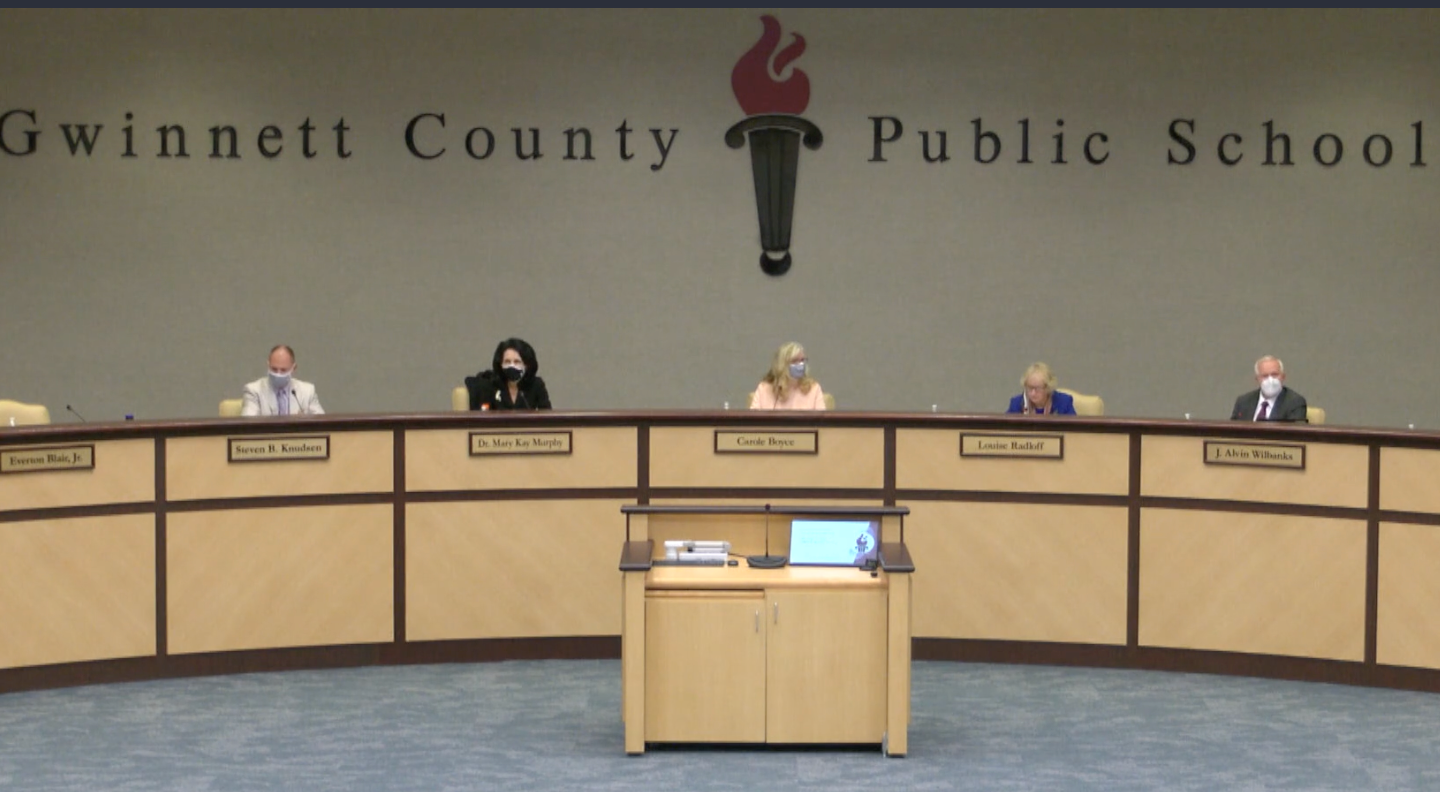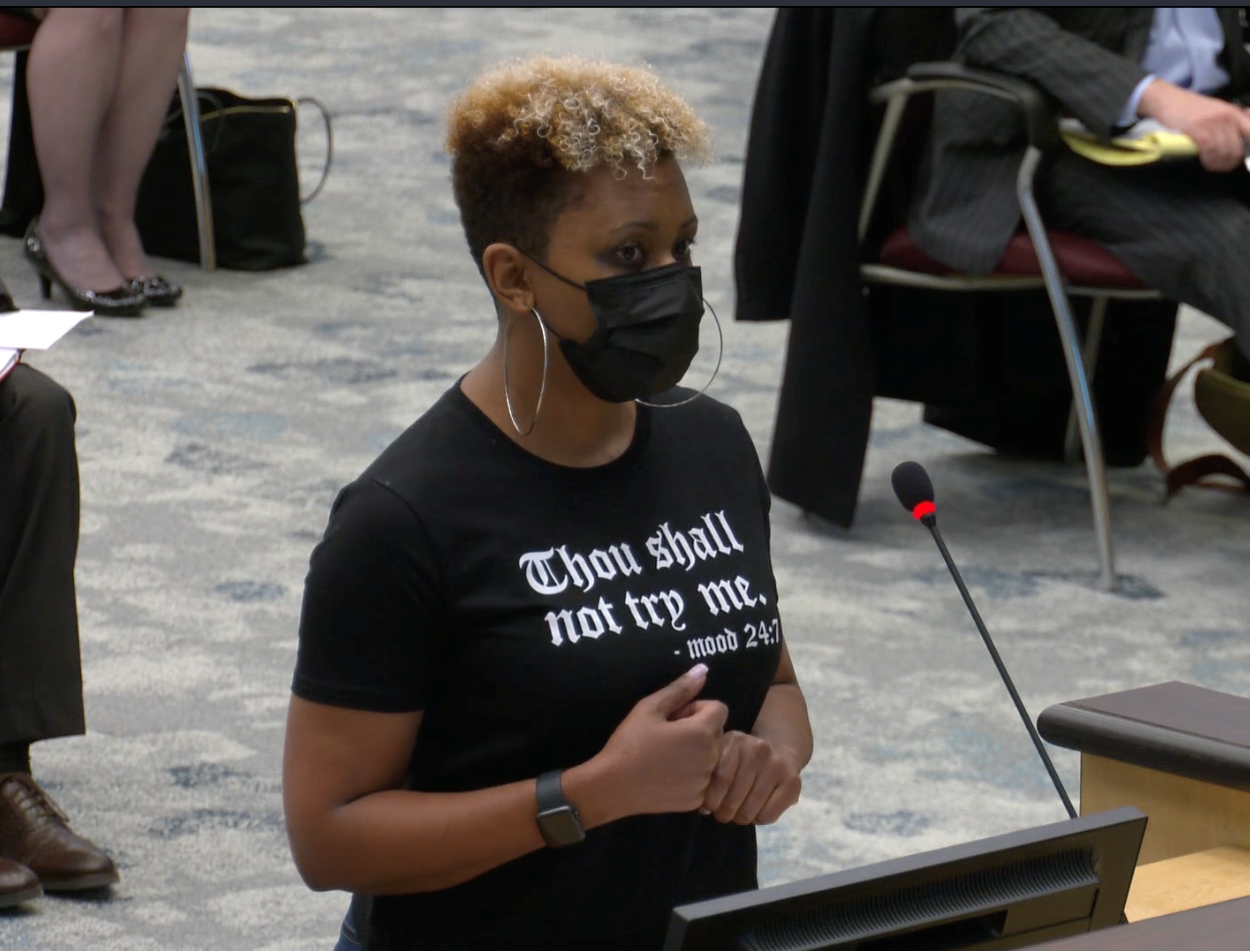As Gwinnett School Board Changes, Divisions Continue

For years, all five members of the Gwinnett County school board were white. Now the board has three members of color and two white members. (Picture from 2020.)
For years, the Gwinnett County Public Schools’ student population has been racially diverse. For most of that time though, those students have been represented by an all-white school board.
The ‘Lag Effect’
In 2018, voters elected Gwinnett’s first board member of color, Everton “EJ” Blair, a graduate of Shiloh High School. Then, in November 2020, two women of color were elected to the board: Dr. Tarece Johnson and Karen Watkins. Now the board has three members of color and two white board members.
The demographic shift has led to some tense board meetings recently.
“Racial change in the suburbs is accelerating, but suburban districts are going through stuff that in central cities happened decades ago,” said Jeffrey Henig, a professor of political science and education at Columbia University in New York.

Henig said that while Atlanta’s flip in racial control happened in the ’60s and ’70s, the suburbs are likely going through a similar change now. He said there’s often a “lag effect” between when schools and their boards diversify.
“Racial change in the school system happens before the population,” he said. “Then racial change of the population happens, typically, before you get racial change in the elected officials.”
Henig said these kinds of racial changes in leadership typically create tension, which has been apparent during some Gwinnett school board meetings.
… suburban districts are going through stuff that in central cities happened decades ago.”
– Jeffrey Henig, professor of political science and education at Columbia University
Board members and the community have been divided over issues like whether schools should reopen for in-person learning. Superintendent Alvin Wilbanks supported a plan last summer to return in person when Gwinnett had the highest COVID-19 infection rate in the state.
That caused some to question his judgment. Soon rumors started about whether the board would vote Wilbanks out.
That didn’t sit well with some parents, like Bob Christiansen.
“Please do not fire him or be tempted to fire him to implement a radical agenda,” he said at a meeting in February. “For instance, to indoctrinate children in Critical Race Theory, implement the 1619 Project or whatever. These ideas are very controversial. We don’t need to go there. And it would cause a severe public backlash in my opinion.”
Critical Race Theory and the 1619 Project — an initiative that reframes the history of slavery in the U.S. — are not part of Gwinnett’s curriculum. Christiansen wasn’t the only parent to mention them, though.
Henig says these kinds of issues tend to come up when school boards change their racial makeup.
“People’s fears and anxiety are around this notion of the shift of control,” Henig said. “They may think, ‘Oh, yeah, well, they’re not saying Critical Race Theory now, but come back in a year or two, and that’s what we’re going to be hearing.’”
More Than Meets The Eye
The controversy around Wilbanks, though, is more nuanced and not a simple power play.
The board did vote last month to look for a new superintendent now even though Wilbanks’ contract isn’t up until next year. The 3-2 vote was split along racial lines.
It took some community members, like Holly Terei, by surprise.
“I actually feel marginalized,” she told the board after the vote. “I just witnessed my school board vote my superintendent out with no reason given. I am slightly astounded by what I just witnessed. You are deepening the divide in this county by making the decisions you just did.”
But others, like Exquisitive Hundley, were ready for Wilbanks to leave.

At a board meeting at the beginning of 2021, Hundley pointed out that students of color in Gwinnett are disciplined at a higher rate than their white peers. (That’s true for many districts in Georgia and the U.S. The Gwinnett school board plans to review its discipline policies at its April work session.)
However, Hundley laid the blame for Gwinnett’s discrepancy at Wilbanks’ feet.
“In 2019, approximately 50% of the 10,000 out-of-school suspensions [in Gwinnett] were Black children,” she said. “Mr. Wilbanks’ solution is typically to ignore it or set up equity meetings. After 24 years, you don’t know what the problem is, sir?”
Everton Blair, the board’s first member of color who is now the chair, said the vote didn’t come out of the blue. Wilbanks announced he planned to leave next July when his contract ends. Blair said the board met with Wilbanks several times privately to discuss the possibility of him leaving sooner.
“We had numerous conversations as a collective,” Blair said. “And when I say collective, that is the board as an entity with all five members present, and the superintendent as a separate entity, a separate party, but all of us together in one room, hashing out everything from structure to process to order.”
Blair said the move wasn’t about shoving Wilbanks out, but about giving the board enough time to find a new leader.
“It’s a longer runway,” he said. “We can be super diligent in our search.”
The board has enlisted the Georgia School Boards Association (GSBA) to lead the search for a new superintendent. The hope is to have a new leader in place by July before the new school year begins.
For some, though, the decision to replace Wilbanks now is unsettling.
He has led the Gwinnett schools for 25 years. Under his leadership, the district has won national recognition.
But others believe it’s time for a change.
A district as diverse as Gwinnett, they say, needs leadership that reflects that diversity.








